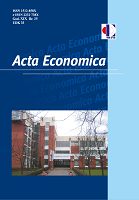IMPACT OF CROP PRODUCTIVITY ON POVERTY AMONG FARM HOUSEHOLDS IN GHANA
IMPACT OF CROP PRODUCTIVITY ON POVERTY AMONG FARM HOUSEHOLDS IN GHANA
Author(s): Boahen Atta Oppong, Edward Ebo Onumah, Ramatu M. Al-Hassan, Akwasi Mensah-BonsuSubject(s): National Economy, Agriculture, Political Ecology, ICT Information and Communications Technologies
Published by: Економски факултет Универзитета у Бањој Луци
Keywords: policy; technology; productivity; income; welfare; agroecology;
Summary/Abstract: Ghana Poverty Reduction Strategy I & II sought to increase crop productivity to reduce high poverty incidence in farm sector, but the magnitude of impact of the productivity on poverty is not present in all agro-ecological zones in Ghana. The aim of the study is to estimate poverty headcount ratio, poverty gap and poverty severity, and link crop productivity to poverty according to agroecology subject to a two-step instrumental variable regression technique using Pseudo Panel data from the Ghana Living Standards Survey (GLSS rounds 5 & 6). Farmers’ poverty headcount ratio, poverty gap, and poverty severity reduced from 57%, 25%, and 14% in 2005 to 37%, 14%, and 7% in 2013 respectively. The result further indicates that 1% growth in crop productivity reduces the probability of poverty headcount ratio, poverty gap and poverty severity by 0.28%, 0.38% and 0.75% respectively in all agro-ecological zones. Additionally, the paper shows that education, livestock and remittance income reduces poverty, while household size and great distance to access water increase poverty differently from agro-ecology. The study recommends rapid crop productivity growth by prioritizing technology adoption and institutional coordination to suit agro-ecological conditions among the poor, illiterate and non-partisan.
Journal: Acta Economica
- Issue Year: 19/2021
- Issue No: 35
- Page Range: 77-94
- Page Count: 18
- Language: English

